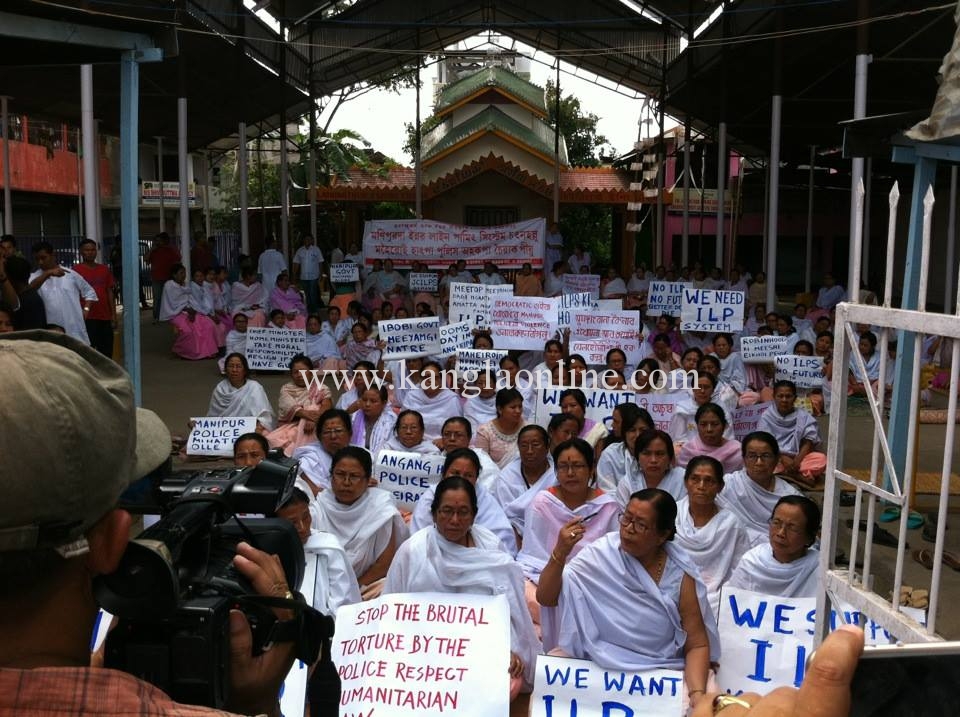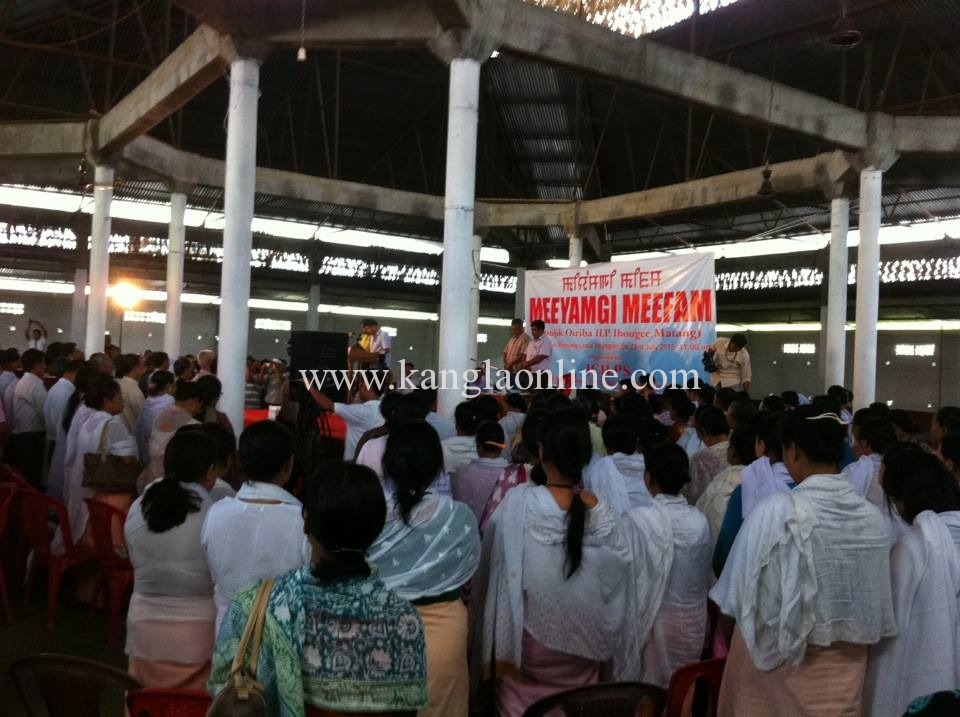
`Suspend personnel involved in Robinhood`s death; provide written assurance to incorporate five-point recommendation`
IMPHAL July 23: The Joint Committee on Inner Line Permit System has decided to extend its deadline for a new bill to monitor the unabated influx of outsiders into the State for a month following an intense five hour long brainstorming with the public and other leaders during a public consultative meeting.
The meeting convened to pool public opinion and suggestions on the present impasse between the State government and JCILPS was held at the Iboyaima Shumang Leela Shanglen and organised by the committee.
More than 500 individuals participated in the intense discussion which was moderated by senior journalist Irengbam Arun.
The meeting commenced with the observance of a 2-minute silence in memory of Sapam Robinhood who was killed in police action to control a student rally on July 8.
At the end of the meeting the committee and those attending jointly resolved to extend the deadline set for the government to draft a new bill provided the government is ready to meet certain conditions.
The first of the conditions arrived at was for the government to pass the new bill before August 15 and that the government would provide a written insurance that it will incorporate the five points which were earlier recommended by the JCILPS to the government during the preparation of the now withdrawn Manipur Regulation of Visitors, Tenants and Migrant Workers Bill 2015.
Another condition was immediate suspension of the police personnel involved in the death of Sapam Robinhood and constitution of a judicial enquiry.

However, the meeting also resolved that people`s movement will continue until the new bill is passed by the Manipur Legislative Assembly.
Moderating the discussion, Arun explained that the purpose and the imperative need of the consultation was to streamline the future course of the movement.
He also observed that the last bill which stands withdrawn now following much public outcry was a misleading and mockery of the public demand.
He also explicitly asserted that the movement is not anti-non domicile and public should also be mindful/considerate of sensitive conducts and inconvenience due to instant impositions of bandhs, general strikes etc.
JCILPS co-convenor BK Moirangcha in his key-note address said for almost three years now, since November 2012 to be precise, the JCILPS has been campaigning for a legislation to legally safeguard the rights of the people of Manipur.
Several speakers from different fields of expertise also shared the platform to express their views on the present movement with the core concerns of almost all speakers centering on the alarming tripling of non-indigenous population of the State and the indigenous people`s shrinking ownership of resources especially land.
Executive members of the JCILPS also detailed the five-point recommendation which has already been submitted to the government and further sought a consensus on the points from those attending the meeting.
It was also observed during the meeting that the wave of support in the ongoing movement has come from the ordinary laymen including women groups, senior citizens, local clubs, individuals, CBOs and CSOs.
Leaders and representatives of the United Committee Manipur, All Manipur United Clubs` Organisation, Information Center for Hill Areas, Manipur also attended and placed suggestions on the present movement.
Several speakers also raised issues on the need to re-open educational institutes, which have today become the major casualty sufferers during any movement in the State.
One of the speakers, Dr Khomdon Lisam voiced his concern about the absence of a guiding constitutional expert in the present drafting committee constituted by the government to prepare the bill.
People`s Action for National Democratic Movement (PANDAM) president Yumnamcha Dilip Kumar also raised concern over the trust deficit of the public on the present government and its tactics, ever since the latter `betrayed the public.`
He further suggested opening up of a communication channel between the JCILPS and the government to ensure that the five-point recommendation is incorporated in the bill this time.
Titular king of Manipur Leishemba Sanajaoba implored the government to empathise and acknowledge the popular sentiment of the people and safeguard `our identity.`
He continued that the government should constitute a well represented drafting committee which will be acceptable to the public and incorporate the recommendation of the JCILPS.
He also sought penalty for the police personnel involved in the action which led to the death of Sapam Robinhood.
Meanwhile, another speaker questioned as to why the government failed to utilise the Law Secretary, the Advocate General or a constitutional expert for drafting such an important law.
Senior citizen Dr Arambam Lokendro also asserted that JCILPS being the representative of the public has the right to be informed about the progress of the drafting process of the bill and on the status of the five points.
The government drafting committee should also accommodate further suggestions that evolved from public consultations, he observed.
He suggested few actions for the government to restore the trust of the people, which include constituting a judicial inquiry on the death of Sapam Robinhood, extending official invitation to JCILPS, and drawing up ILPS or a similar law to safeguard the indigenous people in the State.
He also shared his concern about the national media projecting the movement in a different light.



